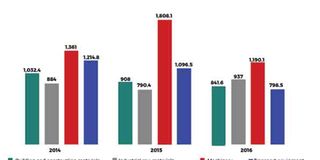Industrialisation path bumpy as imports of capital goods decline

What you need to know:
This comes amid the government’s efforts to curb what it terms as wasteful expenditure.
However, economists are of the view that improving current account deficit by reducing importation of capital goods is bad for Tanzania’s industrialisation agenda.
Dar es Salaam. The current account deficit narrowed significantly during the past three years as the country cuts imports.
This comes amid the government’s efforts to curb what it terms as wasteful expenditure.
However, economists are of the view that improving current account deficit by reducing importation of capital goods is bad for Tanzania’s industrialisation agenda.
Capital goods worth $2.63 billion were imported in 2016, down from $3.813 billion the previous year.
Capital goods include building and construction materials, transport equipment and machinery. Importation of building and construction materials, transport equipment and machinery fell by 27.2 per cent, 29.3 and 34.2 per cent respectively, according to Bank of Tanzania (BoT) figures.
The current account measures money flows to the country in terms of goods and services.
A deficit shows that more funds went out than came in over a specific period.
This forms part of the country’s balance of payments position, which captures the country’s total transactions with the rest of the world.
The Bank of Tanzania (BoT)’s latest data revealed that the current deficit account fell to $2.054 billion (Sh4.5 trillion) last year from $3.543 billion (Sh7.9 trillion) in 2014.
This, according to BoT, was attributed to the decline in imports particularly services and increase in exports of both goods and services.
Last year, the value of imports of goods and services stood at $10.7 billion (Sh23.8 trillion), down from $13.6 billion posted in 2014 (Sh30.3 trillion). However, according to an economist from the Policy Research for Development (Repoa), Dr Abel Kinyondo, the fact that much of the decline has been in the area of importation of machinery, transport equipment as well as building and construction materials means that the country’s industrialisation goal may take much more time to be achieved.
“We would expect that importation of capital goods should be increasing as the country promotes industrialisation….the decline in capital goods is a reason to worry, taking into consideration the fact that we do not have the capacity to produce them locally,” said Dr Kinyondo.
He said a drop in importation of capital goods is in fact a sign of retardation in investment which should give the country enough reasons to worry.
“The government needs to come out clearly and rekindle investors’ confidence,” he said.
Prof Haji Semboja from the University of Dar es Salaam shared similar sentiments, noting that improvement in the current account deficit, driven by decline in imports of capital goods, is not healthy for the economy.
The solution to the challenge, he said, lies in making the local market more predictable to producers.
“The market for industrial goods is repeatedly disturbed by competition from unknown sources and illegal imports…this must be dealt with,” said Prof Semboja, noting that failure to deal with issues that affect importation of capital goods jeopardises the industrialisation dream.According to Prof Semboja, the government should also formalise small-scale trading.
“The government should rethink on how to help hawkers so that they can be included in books of accounts and graduate to the next stage that will leverage on development of industrial sector,” Prof Semboja opined.
Tanzania’s industrial sector experienced an average annual growth of eight per cent over the past five years. In July this year, Industry, Trade and Investment minister Charles Mwijage, unveiled measures aimed at preventing the collapse of local industries.
Measures announced by the Minister include controlling sub-standard and counterfeit products and curbing under valuation and under declaration of goods.
This is aimed at enhancing fair competition in the market.
“A team comprising officials from my ministry, Home Affairs, and Finance and Planning ministries have been formed to ensure the initiatives were implemented as planned,” noted Mr Mwijage.



